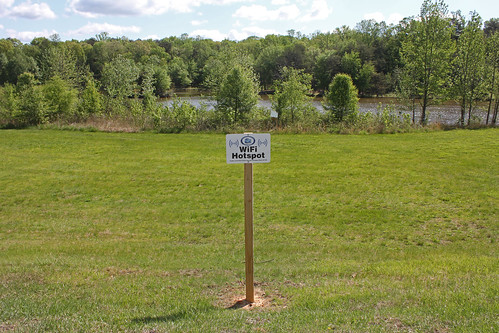 The latest gimmick to come out of SXSW has troubled quite a few people while also offering a valuable service. A marketing company called BBH has provided several homeless people with mobile wifi hubs–I think that’s the right term, but I’m not much of a techie–so people can quickly access the internet in downtown Austin, where the sheer mass of people makes accessing the 3G network problematic.
The latest gimmick to come out of SXSW has troubled quite a few people while also offering a valuable service. A marketing company called BBH has provided several homeless people with mobile wifi hubs–I think that’s the right term, but I’m not much of a techie–so people can quickly access the internet in downtown Austin, where the sheer mass of people makes accessing the 3G network problematic.
The plan has caused pretty substantial controversy, with reporting in the New York Times and even on BBC News.
I’m of two minds on the matter. For one thing, the name of the program, “Homeless Hotspots,” seems exploitative. Actually, the whole program seems exploitative in one way or another. At the same time, it is offering an opportunity that did not otherwise exist. I think the real debate should be in how the program is managed and how revenues are distributed–payments go directly to the company via PayPal.
Alternet offered a reasonable criticism of the program:
Mark [West] told us that they found him through a homeless shelter in Austin, where he has a case manager helping him look for employment. He doesn’t have an option while he’s out providing internet to check and see how much money he’s earned, but he had cards to hand out to passersby as well with his name on them (he was writing his name on the cards with a Sharpie) so that they could find and donate to him directly.
“The weather and the holidays were kind of sketchy,” he said, “I’m very confident that I’ll have something before summer. I took this opportunity to work now.”
“It’s your company,” he stressed, “What you bring in is what you bring in. They bought the devices, they’re allowing us to use the devices to bring in our own revenue.” But as my colleague Matt Bors noted, when you actually own your own business, no one takes away your supplies after four days. You don’t work for a suggested donation. You work for a salary, for an hourly rate, when you work for a company.
BBH compared the work to the street newspapers that homeless people in many cities use to raise money, but the key difference there is that in those cases, the newspapers are written by the homeless, and contain content that has political views. In this case, Mark cannot use the service he is providing, nor are the users of his service getting his story or his political views.
Of course, this is assuming that the point of the program is to spotlight the problem of homelessness, as opposed to offering a gimmicky service. The major difference between wifi service and newspapers, in my opinion, is that newspapers exist almost solely to convey viewpoints and opinions. The “Homeless Hotspots” program is primarily about allowing people in downtown Austin to get on the internet. Whether they are somehow exploiting or mistreating the homeless people involved in the program, I suspect, is the real controversy. I’m just not convinced that this is a particularly strong argument. Putting homeless people on a sort of technological display seems preferable to a different extreme, as noted by John Cole:
How is paying someone to distribute wifi access any different than paying someone to work in your food stand at SXSW for a week? I don’t see anything unseemly or wrong about it at all- they are providing a service and making some money, and I fail to see how it is different from a vendor selling t-shirts or bottled water.
And the fact that they are using homeless people seems to be better than what normally happens any time a big conference comes to a big city, which is basically they are cleared off the streets and penned up out of sight and out of mind. Again, maybe I’m wrong, but I just don’t get what is so awful about this.
My jury is still out on this. Discuss.
Photo credit: ‘secret wifi hotspot’ by woodleywonderworks, on Flickr.

